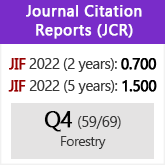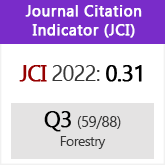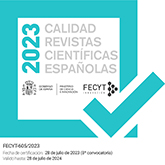Stakeholders’ perception of forest management: a Portuguese mountain case study
Abstract
Aim of study: This paper aims to test a participatory methodology to draw parallels and paradoxes as to how some forest sector-related entities and local communities view the Montemuro Mountain forest, namely in terms of its characteristics, the offered opportunities, its problems and the likely solutions for its management as well as the role played by stakeholders, which can be replicated in other case studies and can also facilitate the forest policy making process.
Area of study: The Natura 2000 Network “Montemuro Mountain” Site in Portugal.
Material and methods: This study combined several consultation and citizen participation techniques.
Main results: The perceptions shared by the stakeholders are some similar, others not similar and others still quite paradoxical regarding forest characteristics and the opportunities they offer. The study has shown that it is possible to implement and improve citizen participation methodologies. This can be a viable way towards more effective forest management and fire prevention as this may help blunt conflicts of interest in forest space management. However, for participation to be truly effective and representative, a policy regarding training and awareness of the importance of information is necessary.
Research highlights: The stakeholder perceptions on forests and forest management are assessed; forest fires and agrarian abandonment are central for territory’s development; depopulation, old age and absenteeism emphasize degradation of forest areas; Conscious citizen participation benefit policymaking and forest management.
Abbreviations used: ZIF: Forest Intervention Zones; GAL: Local Follow-up Group; GTFs: Technical Bureaus of Forestry.
Downloads
References
References
Aguiar C, Pinto B, 2007. Paleo-história e história antiga das florestas de Portugal continental: até à Idade Média. In Árvores e florestas de Portugal: floresta e sociedade, uma história comum (Silva JS, eds). Jornal Público, Fundação Luso-Americana para o Desenvolvimento, Liga para a Protecção da Natureza, Lisbon, Portugal. pp: 15-53.
André P, Enserink B, Connor D, Croal P, 2006. Public participation international, best practice principles. Special publication series Nr. 4, Int Ass Impact Assessment, Fargo, USA. 3 pp.
Arnstein SR, 1969. A ladder of citizen participation. J Am Inst Planners 35(4): 216-224. http://dx.doi.org/10.1080/01944366908977225
Azevedo J, Tibério L, Torres F, Fonseca C, Almeida L, Capapé A, Marta A, Mascarenhas A, Mesquita M, Magalhães M, et al., 2009. Plano de gestão integrada do sítio PTCON0025 Montemuro. Relatório final – plano de acção. University of Trás-os-Montes e Alto Douro, Vila Real, Portugal, 89 pp.
Bryden J, Mittenzwei, K, 2013. Academic freedom, democracy and the public policy process. Sociologia Ruralis 53(3): 311-330. http://dx.doi.org/10.1111/soru.12012
Buchy M, Hoerman S, 2000. Understanding public participation in forest planning: a review. Forest Policy and Economics 1: 15-25. http://dx.doi.org/10.1016/S1389-9341(00)00006-X
Castro M, 2008. A utilização dos pequenos ruminantes na prevenção dos incêndios rurais: estratégia pró-activa de promoção silvopastoril. In A silvopastorícia na prevenção dos fogos rurais (Moreira MB, Coelho IS, coord). ISA Press, Lisbon, Portugal. pp: 159-175.
Catry F, Rego FC, Bugalho MN, Lopes T, Silva JS, Moreira F, 2006. Effects of fire on tree survival and regeneration in a Mediterranean ecosystem. Forest Ecol Manag 234: S180-S207. http://dx.doi.org/10.1016/j.foreco.2006.08.316
DGRF, 2006. Estratégia nacional para as florestas. Direção Geral dos Recursos Florestais, Lisbon, Portugal. 189 pp.
Dubuisson-Quellier S, Lamine C, Le Velly R, 2011. Citizenship and consumption: mobilisation in alternative food systems in France. Sociologia Ruralis 51(3): 304-323. http://dx.doi.org/10.1111/j.1467-9523.2011.00540.x
EC, 2005. Council Decision 2005/370/EC on the conclusion, on behalf of the European Community, of the Convention on access to information, public participation in decision-making and access to justice in environmental matters. Official J European Union L 124, 17/02/2005. pp. 1-3.
Fabra-Crespo M, Mola-Yudego B, Gritten D, Rojas-Briales E, 2012. Public perception on forestry issues in the Region of Valencia. Forest Systems 21(1): 99-110. http://dx.doi.org/10.5424/fs/2112211-11309
FAO, 2006. The Role of Agriculture and Rural Development in Revitalizing Abandoned/Depopulated Areas. Document prepared under the supervision of the Policy Assistance Branch Regional Office for Europe. 24 pp.
Hayward C, Simpson L, Wood L, 2004. Still left out in the cold: problematising participatory research and development. Sociologia Ruralis 44(1): 95-108. http://dx.doi.org/10.1111/j.1467-9523.2004.00264.x
Howlett M, Rayner J, 1995. Do ideas matter? Policy network configurations and resistance to policy change in the Canadian forest sector. Canadian Public Administration 38: 382-410. http://dx.doi.org/10.1111/j.1754-7121.1995.tb01055.x
Howlett M, Rayner J, Tollefson C, 2009. From government to governance in forest planning? Lessons from the case of the British Columbia great bear rainforest initiative. Forest Policy Econ 11: 383-391. http://dx.doi.org/10.1016/j.forpol.2009.01.003
IBM Corp, Released 2010. IBM SPSS Statistics for Windows, Version 19.0. IBM Corp, Armonk, NY.
IBM Corp, Released 2012. IBM SPSS Statistics for Windows, Version 21.0. IBM Corp, Armonk, NY.
ICN, 2006. Plano sectorial Rede Natura 2000, sítio serra de Montemuro. Instituto da Conservação da Natureza, Lisbon, Portugal.
ICNF, 2013. 6º Inventário Florestal Nacional (IFN6) – áreas dos usos do solo e das espécies florestais de Portugal continental, resultados preliminares. Instituto da Conservação da Natureza e Florestas, Lisbon, Portugal.
INE, 2011. Recenseamento da população. Dados provisórios. Available in http://www.ine.pt/xportal/xmain?xpid=INE&xpgid=ine_main. [15 march 2012].
IGP, 2006. Carta de uso e ocupação de solo de Portugal Continental (COS90 2005).
Klenk NL, Reed MG, Lidestav G, Carlsson J, 2013. Models of representation and participation in model forests: dilemmas and implications for networked forms of environmental governance involving indigenous people. Env Pol Gov 23: 161-176. http://dx.doi.org/10.1002/eet.1611
Krom MPMM, Dessein J, Erbout N, 2014. Understanding relations between science, politics, and the public: the case of a GM field trial controversy in Belgium. Sociologia Ruralis 54(1): 21-39. http://dx.doi.org/10.1111/soru.12031
Manso FT, 2008. A problemática das relações entre a floresta, o fogo e o pastoreio: resultados indicadores no norte de Portugal. In A silvopastorícia na prevenção dos fogos rurais (Moreira MB, Coelho IS, coord). ISA Press, Lisbon, Portugal. pp: 141-157.
Marta-Costa AA, Pinto R, Torres Manso F, Tibério ML, Carneiro I, Fernandes P, Botelho H, 2013. Participação pública e gestão florestal na serra de Montemuro: entre a perceção e a realidade. Sodivir – Edições do Norte Lda., Vila Real, Portugal. 166 pp.
Martineau-Delisle C, Nadeau S, 2010. Assessing the effects of public participation processes from the point of view of participants: significance, achievements, and challenges. The forestry chronicle 86(6): 753-765. http://dx.doi.org/10.5558/tfc86753-6
Moreira M, 2008. A Pastorícia como prevenção dos fogos rurais: A necessidade de um novo empreendedorismo. In A silvopastorícia na prevenção dos fogos rurais (Moreira MB, Coelho IS, coord). ISA Press, Lisbon, Portugal. pp: 99-122.
Newig J, Fritsch O, 2009. Environmental governance: participatory, multi-level – and effective? Environ Policy Governance 19: 197-214. http://dx.doi.org/10.1002/eet.509
Nohl W, 1997. Halbierter Naturschutz. Nature conservation only half the job! Natur und Landschaft 4: 221-232.
Osti G, 2010. Mobility demands and participation in remote rural areas. Sociologia Ruralis 50(3): 296-310. http://dx.doi.org/10.1111/j.1467-9523.2010.00517.x
Pinho J, 2008. Organização do território e defesa da floresta contra incêndios. In A silvopastorícia na prevenção dos fogos rurais (Moreira MB, Coelho IS, coord). ISA Press, Lisbon, Portugal. pp: 31-47.
Presidência do Conselho de Ministros, 2006. Resolução do Conselho de Ministros n.º 65/2006 of 26 May, relativa ao Plano Nacional de Defesa da Floresta Contra Incêndios. Diário da República de Portugal No. 102, I-B Série, 26/05/2006. pp. 3511-3559.
Presidência do Conselho de Ministros, 2015. Resolução do Conselho de Ministros n.º 6-B/2015 of 4 February, relativa à Estratégia Nacional para as Florestas. Diário da República de Portugal No. 24, I Série, 04/02/2015. pp. 692(2)-692(92).
Pretty J, 1995. Participatory learning for sustainable agriculture. World Development 23(8): 1247-1263. http://dx.doi.org/10.1016/0305-750X(95)00046-F
Rametsteiner E, Kraxner F, 2003. Europeans and their forests. What do europeans think about forests and sustainable forest management? A review of representative public opinion surveys in Europe. Ministerial Conference on the Protection of Forests in Europe (MCPFE), Liaison Unit Vienna, Vienna, Austria. 56 pp.
Reed MS, Graves A, Dandy N, Posthumus H, Hubacek K, Morris J, Prell C, Quinn CH, Stringer LC, 2009. Who's in and why? A typology of stakeholder analysis methods for natural resource management. J Environ Manage 90: 1933-1949. http://dx.doi.org/10.1016/j.jenvman.2009.01.001
Renn O, 2006. Participatory processes for designing environmental policies. Land Use Policy 23(1): 34-43. http://dx.doi.org/10.1016/j.landusepol.2004.08.005
Robinson EJZ, Albers HJ, Meshack C, Lokina RB, 2013. Implementing REDD through community-based forest management: lessons from Tanzania. Natural Resources Forum 37: 141-152. http://dx.doi.org/10.1111/1477-8947.12018
Rodriguez R, Losada M, Franco R, Hernández M, Urtiaga J, 2008. Prevención de incendios mediante sistemas silvopastorales. In A silvopastorícia na prevenção dos fogos rurais (Moreira MB, Coelho IS, coord). ISA Press, Lisbon, Portugal. pp: 77-98.
Rydzik A, Pritchard A, Morgan N, Sedgley D, 2013. The potential of arts-based transformative research. Annals Tourism Research 40: 283-305. http://dx.doi.org/10.1016/j.annals.2012.09.006
Sannof H, 1999. Community participation methods in design and planning. Jonh Wiley &Sons, Inc., New York, USA. 320 pp.
Santos H, 2008. Novos rumos, caminhos velhos. In A silvopastorícia na prevenção dos fogos rurais (Moreira MB, Coelho IS, coord). ISA Press, Lisbon, Portugal. pp: 23-47.
Santos F, Martins H, Borges J, 2004. Desenvolvimento de abordagens participativas no planeamento florestal português. Silva Lusitana 12: 67-76.
Siebert R, Toogood M, Knierim A, 2006. Factors affecting European farmers' participation in biodiversity policies. Sociologia Ruralis 46(4): 318-340. http://dx.doi.org/10.1111/j.1467-9523.2006.00420.x
Torres Manso F, Bento J, Botelho H, Pinto R, Ferreira P, Magalhães M, Gomes M, 2010. Avaliação de características regionais e sazonais inerentes ao regime de fogo e ao pastoreio. Silva Lusitana 18(1): 27-45.
Uriarte M, Pinedo-Vasquez M, DeFries R, Fernandes K, Gutierrez-Velez V, Baethgen W, Padoch C, 2012. Depopulation of rural landscapes exacerbates fire activity in the western Amazon. PNAS 109(52): 21546-21550. http://dx.doi.org/10.1073/pnas.1215567110
Valente S, Coelho C, Ribeiro C, Liniger H, Schwilch G, Figueiredo E, Bachmann F, 2015. How much management is enough? Stakeholder views on forest management in fire-prone areas in central Portugal. Forest Policy Econ 53: 1-11. http://dx.doi.org/10.1016/j.forpol.2015.01.003
Vallely A, Shagi C, Kasindi S, Desmond N, Lees S, Chiduo B, Hayes R, Allen C, Ross D, 2007. The benefits of participatory methodologies to develop effective community dialogue in the context of a microbicide trial feasibility study in Mwanza, Tanzania. BMC Public Health 7(133): 1-12. http://dx.doi.org/10.1186/1471-2458-7-133
Vélez R, 2002. The causes of forest fires in the Mediterranean basin. In Risk management and sustainable forestry (Arbez M, Birot Y, Carnus JM, eds). European Forest Institute, Finland. pp. 35-42.
Vélez R, 2009. The causing fires: a focus on economic and social driving forces. In Living in wildfires: what science can tell us. Discussion paper 15. (Birot, ed). EFFI, European Forest Institute, Joensuu. pp: 21-25.
Young JC, Jordan A, Searle KR, Butler A, Chapman DS, Simmons P, Watt AD, 2013. Does stakeholder involvement really benefit biodiversity conservation? Biol Conserv 158: 359-370. http://dx.doi.org/10.1016/j.biocon.2012.08.018
Wallace LJ, 2012. An actor-network approach to Canadian forest research: The case of a New Brunswick policy debate. The Canadian Geographer / Le Géographe canadien 56: 362-380. http://dx.doi.org/10.1111/j.1541-0064.2012.00436.x
Wells M, Brandon K, Hannah L, 1992. People and parks: Linking protected areas management with local communities. World Bank, World Wildlife Fund, Washington DC.
Wolf SA, 2011. Network governance as adaptive institutional response: the case of multifunctional forested landscapes. J Nat Resources Policy Research 3(3): 223-235. http://dx.doi.org/10.1080/19390459.2011.591760
© CSIC. Manuscripts published in both the printed and online versions of this Journal are the property of Consejo Superior de Investigaciones Científicas, and quoting this source is a requirement for any partial or full reproduction.
All contents of this electronic edition, except where otherwise noted, are distributed under a “Creative Commons Attribution 4.0 International” (CC BY 4.0) License. You may read here the basic information and the legal text of the license. The indication of the CC BY 4.0 License must be expressly stated in this way when necessary.
Self-archiving in repositories, personal webpages or similar, of any version other than the published by the Editor, is not allowed.















